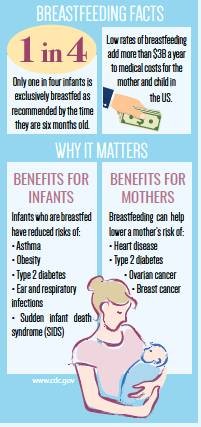It's Only Natural


Each year from Aug. 1-7, World Breastfeeding Awareness Week is used to highlight the benefits of nursing children and to dispel misconceptions.
Sarah Deese, RN, BSN, IBCLC (International Board Certified Lactation Consultant), said while openly discussing breastfeeding and public nursing are no longer considered taboo, misconceptions still exist.
“Many people still think breastfeeding a baby alone does not provide what they need while others believe moms do not produce enough milk for their child,” she said. “But a woman’s body was designed to produce milk for babies to consume. This is how babies were fed from the beginning of time until formula was created.”
Deese is part of the OB team at Jennings American Legion Hospital, as well as its Comprehensive Breast Care Clinic. As an IBCLC, she helps new mothers learn the ropes when it comes to nursing.
“We actually like to start discussing breastfeeding from the beginning of the pregnancy,” she said. “For the women who know they want to breastfeed, this prepares them. It keeps them from having to suddenly learn the ins and outs of nursing only when their baby is delivered, a time when the mom is tired and hurting. The average mother nurses her baby every two to three hours a day. Your goal is to have 8-10 feedings in a 24-hour period. But if a mother is nursing, she is the only person who can feed that child, which can sometimes feel overwhelming for the mom early on.”
Parents of a newborn might be tempted to incorporate pacifiers and bottles into a breastfeeding routine in the first few weeks after birth. Deese said this can lead to “nipple confusion.”
“Commercial nipples do not look like a human nipple,” she said. “If babies become used to the artificial nipple, sometimes they will refuse the breast. They lose the concept of nursing. I advise patients to wait at least four weeks until introducing an artificial nipple.”
Even if parents choose to utilize commercial nipples, Deese said, the benefits of mother’s milk far outweigh that of formula.
“Very few women truly are not able to breastfeed due to health issues or because they take certain medications,” Deese said. “Sometimes a new mother feels that she or her child simply can’t do it. It can be frustrating for a new mom because a lot of people think breastfeeding is something you and your baby handle perfectly from the moment you deliver. It’s not.”
Initial difficulties sometimes present themselves, such as anatomical issues in a baby’s mouth, unusual nipple and/or breast shape, newborn sleepiness and breast pain.
“Of course a woman’s breasts will be sore in the days after delivery but breastfeeding should never hurt,” Deese said. “The way a baby latches makes a big difference. If it hurts to breastfeed, something is wrong.”
Some mothers believe they cannot nurse their children if they smoke, have certain illnesses or are taking certain medications. Sometimes women in these situations will be advised to ‘pump and dump,’ but that should not be done without checking with an IBCLC, according to Deese. She referenced the annually-updated “Medication and Mothers’ Milk” by Thomas Hale, R.Ph., Ph.D., which contains current science known about medications and exact data on the degree of transfer of medication into human milk. The book also notes any known effects of these medications on mothers and infants, and the relative risks to infants, if any.
Still, there is one more misconception about breastfeeding: that it affects the physical appearance of a woman’s breasts.
“Actually, pregnancy does that,” Deese said. “Whether you breastfeed or not, your breasts prepare to produce milk during pregnancy, and that will usually lead to changes you might notice.”
JALH in recent years and months has increased its efforts to promote breastfeeding. The hospital has been recognized as a breastfeeding-friendly workplace champion by the Louisiana Workplace Breastfeeding Support Program. Skin-to-skin contact between a mother and newborn are encouraged immediately after birth, unless it is medically necessary to separate the two.
“In July, the International Breastfeeding Journal published a study that said newborns who immediately felt skin-to-skin latched sooner for breastfeeding,” Deese said. “Years ago, the baby was taken away after birth, washed then returned to its mother. That was a detriment to breastfeeding. Skin-to-skin is an excellent bonding time that also increases the baby’s body temperature and stabilizes blood sugar.”
JALH instituted Quiet Time from 1-3 p.m. daily in OB to allow mothers the chance to rest, bond with their newborn and learn some of what to expect when they head home.
“New moms feel like they need to accommodate visitors, and of course family and friends are excited to see the new baby,” Deese said. “But mom’s have gone through a lot. They’ve delivered a baby, they are constantly dealing with people in and out of their room and they are suddenly responsible for this new life. So everything goes quiet during that time. We do not enter the patients’ rooms unless necessary or requested. The babies can nap without interruption, because they get overstimulated, too.”
Meanwhile, free breastfeeding education has increased thanks to a partnership with the state Department of Health’s The Gift, an evidencebased program designed to assist state birthing facilities in increasing breastfeeding rates. Those who deliver at JALH are also able to have one-on-one consultations with Deese about a week after delivery. She provides her phone number to these mothers in the event they need guidance after hours.
“The medical community in Jennings really has worked to encourage breastfeeding and support breastfeeding mothers, and we have seen more and more local mothers choosing breastfeeding,” Deese finished. “How a baby is fed is ultimately up to a mother and the factors in her own life, but for the mothers who choose breastfeeding and want or need guidance, we are always ready to help.”
JALH’s upcoming breastfeeding classes are scheduled for 5:30 p.m. Aug. 28, Oct. 23 and Dec. 11. Classes are held in the second-floor classroom. Those interesting in signing up should do so in the JALH OB Clinic office.
